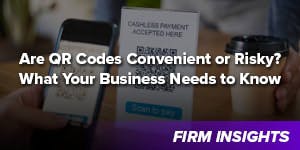
Scarinci Hollenbeck, LLC
The Firm
201-896-4100 info@sh-law.comAuthor: Scarinci Hollenbeck, LLC|July 24, 2014
Would you send an important communication on a postcard? For most businesses, the answer is likely no.
Yet companies send unsecured business emails every day, which share many of the same characteristics as postcards. These messages can be intercepted and read by entities other than the intended recipient. The identity of the sender can also be spoofed, and it is difficult to recall a message once it has been sent.
To address these risks, email encryption technology is becoming increasingly important. In some cases, the technology is necessary to comply with regulatory requirements, such as the Health Insurance Portability and Accountability Act (HIPAA) or Payment Card Industry Data Security Standard. However, businesses are also adopting new email standards as part of their risk mitigation and data protection strategies.
The most comprehensive type of email security is end-to-end encryption, in which messages are encrypted on your computer or mobile device and decrypted by the recipient using a special “key.” Anyone who intercepts the message in transit cannot read the message or any attachments without the key.
As highlighted in a recent New York Times article, email encryption tools are becoming more easily accessible for small businesses. For instance, a new app by Virtru works with almost any type of email client. Even more important, recipients do not have to install the program to read the message. Rather, they receive an email that contains a link to your encrypted message, which can be viewed and responded to via the Internet.
For mobile security and privacy, businesses may want to consider the Blackphone. The cellphone, sold by Spanish phone maker GeeksPhone in collaboration with security company Silent Circle, offers a number of unique features, such as private messaging/calling, data encryption, anonymous browsing, and the ability to set specific permissions for each mobile application. However, there are trade offs, including cost – the phone retails for $629 and is not subsidized by cell phone providers – and limited functionality as compared to other phones with inferior security features.
If you have any questions about this post or would like to discuss the issues involved, please contact me, Fernando Pinguelo, or the Scarinci Hollenbeck attorney with whom you work. To learn more about data privacy and security, visit eWhiteHouseWatch (http://ewhwblog.com). You can also check out my new Twitter account and follow me @cyberpinguelo.

The Firm
201-896-4100 info@sh-law.com



Would you send an important communication on a postcard? For most businesses, the answer is likely no.
Yet companies send unsecured business emails every day, which share many of the same characteristics as postcards. These messages can be intercepted and read by entities other than the intended recipient. The identity of the sender can also be spoofed, and it is difficult to recall a message once it has been sent.
To address these risks, email encryption technology is becoming increasingly important. In some cases, the technology is necessary to comply with regulatory requirements, such as the Health Insurance Portability and Accountability Act (HIPAA) or Payment Card Industry Data Security Standard. However, businesses are also adopting new email standards as part of their risk mitigation and data protection strategies.
The most comprehensive type of email security is end-to-end encryption, in which messages are encrypted on your computer or mobile device and decrypted by the recipient using a special “key.” Anyone who intercepts the message in transit cannot read the message or any attachments without the key.
As highlighted in a recent New York Times article, email encryption tools are becoming more easily accessible for small businesses. For instance, a new app by Virtru works with almost any type of email client. Even more important, recipients do not have to install the program to read the message. Rather, they receive an email that contains a link to your encrypted message, which can be viewed and responded to via the Internet.
For mobile security and privacy, businesses may want to consider the Blackphone. The cellphone, sold by Spanish phone maker GeeksPhone in collaboration with security company Silent Circle, offers a number of unique features, such as private messaging/calling, data encryption, anonymous browsing, and the ability to set specific permissions for each mobile application. However, there are trade offs, including cost – the phone retails for $629 and is not subsidized by cell phone providers – and limited functionality as compared to other phones with inferior security features.
If you have any questions about this post or would like to discuss the issues involved, please contact me, Fernando Pinguelo, or the Scarinci Hollenbeck attorney with whom you work. To learn more about data privacy and security, visit eWhiteHouseWatch (http://ewhwblog.com). You can also check out my new Twitter account and follow me @cyberpinguelo.